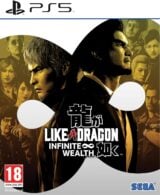Dev says Like a Dragon series must keep using its own engine
The series’ technical director explains why ‘trilingual education’ is important to make Dragon Engine better

This article has been corrected to replace references to Yakuza: Kiwami with references to Like a Dragon: Ishin.
The Like a Dragon series “absolutely must” continue using its bespoke Dragon Engine, but staff must also learn about alternate options, the series’ technical director says.
In an interview with Japanese publication Type, Ryu Ga Gotoku Studio technical director Yutaka Ita stressed that the Dragon Engine is fundamental to the Like a Dragon series, but that it can’t improve without knowledge of alternatives.
Ita explained how the studio used Unreal Engine instead of its own Dragon Engine to make Like a Dragon: Ishin, its remake of the 2014 PS3 and PS4 game. He noted that doing this let the studio identify areas where the Dragon Engine was lacking.
“One of them was the expression of light,” he explained. “In Like a Dragon: Ishin, Unreal Engine made it possible to show shininess in bright daytime environments, and beautifully advanced depth of field.
“Like a Dragon: Infinite Wealth, on the other hand, was developed using the Dragon Engine, but after getting a request to incorporate the effects we were able to achieve in Ishin, we added new lighting features to the engine.”
Ita explained that even though the Like a Dragon series will continue to use the Dragon Engine going forwards, new recruits are also taught how to make games using Unreal and Unity so they can identfy their strengths and help incorporate them into the Dragon Engine.
“We have to keep up with the changes in the games industry,” he said. “Perhaps in the future, if a very good general-purpose game engine comes out, all the game companies in the world may start using it. If Dragon Studio can only use the Dragon Engine at that time, we may no longer be able to compete in this world.
“We don’t know which direction the game industry and development environment will take in the future. That’s why when we train new employees at Ryu ga Gotoku Studio, we have them learn how to create games using three engines – Dragon Engine, Unreal Engine and Unity.
“By knowing the other two engines, we can make the Dragon Engine better and keep up with the game industry whenever its direction changes. That’s what trilingual education is for.”

Ita stressed, however, that there are no plans to move the series to Unreal or Unity, and that the Dragon Engine will remain its cornerstone.
“When creating Like a Dragon, we absolutely must not do away with the Dragon Engine, so we will continue to develop our in-house engine,” he explained.
“The Dragon Engine concentrates development resources on the functions that are necessary for Like a Dragon and, above all, the speed at which new functions can be added is a big advantage.
“If you use a general-purpose engine, you can email support and it takes about three days to get a reply, but if you ask the programmer sitting next to you it only takes five seconds. I think this difference is huge.
“That said, it’s not good to think ‘our game engine is the best!”. I think we programmers in particular should always have a sense of threat: ‘That one is better than ours, we have to work harder’.”











